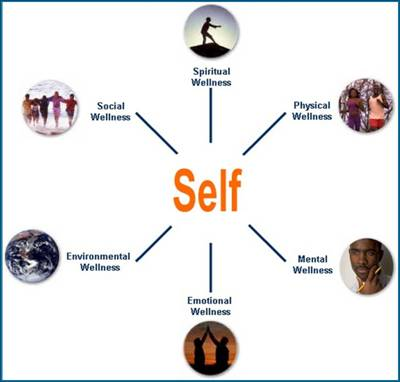Source: www.weswell.blogs.wesleyan.edu
Ever wondered what is meant by the term “wellness”? It can mean many things to many people, but most commonly it references a definition developed by Dr. Halbert L. Dunn in the 1950s. Dunn defined wellness as:
“an integrated method of functioning which is oriented toward maximizing the potential of which the individual is capable. It requires that the individual maintain a continuum of balance and purposeful direction within the environment where he is functioning.”
It could also be defined as actively becoming aware of and pro-actively making choices towards a more successful existence. In other words, wellness emphasizes the state of the entire, interconnected being and its ongoing development rather than simply the absence of disease.
To illustrate the concept, many different wellness models have been developed over the years. The image below show the model that WesWELL looks to for guidance. The model divides wellness into six distinct but inherently interrelated dimensions: Social, Spiritual, Physical, Mental, Emotional, and Environmental.
It is worth mentioning that Career or Vocational Wellness is frequently cited in other models; WesWELL subscribes to the idea that Career Wellness should be attended to throughout the six dimensions rather than as a distinct dimension of it’s own.
Eastern Michigan University’s Wellness Office offers these definitions for the six dimensions:
Social: A socially well person contributes to one’s human and physical environment for the common welfare of one’s community. Ze takes an active role in promoting a healthy living environment, encourages effective communication among community members, and seeks to preserve the beauty and balance of nature. A person experiencing social wellness is living in harmony with hir fellow human beings, seeking positive, interdependent relationships with others, and developing healthy sexual behaviors. A socially well person works for mutual respect and cooperation among the individuals within a community.
Spiritual: Spirituality is about more than simply religion, though it may involve being engaged with organized religion for many people. A person engaged in the process of spiritual wellness is willing and able to transcend oneself in order to question the meaning and purpose in one’s life and the lives of others. Ze is involved in the process of questioning all that is around hir and has an appreciation for that which cannot be completely understood. This person seeks to find harmony between that which lies within and the social and physical forces that come from outside. Feelings of doubt, despair, fear, disappointment and dislocation as well as feelings of pleasure, joy, eagerness and discovery are part of this search for a universal value system.
Physical: This dimension is what most people think of first when they think of wellness. Physical wellness involves taking responsibility and care for minor illness and also knowing when professional medical attention is necessary. Physical wellness includes being able to monitor one’s own vital signs whether perceived or measured. Physical wellness entails an understanding of the relationship between sound nutrition and the functioning of the body. Included in physical wellness is an awareness of the body’s true identity, depth of feelings, tension patterns, reactions, balance and harmony. The body is recognized as a formal expression of physiological development and personal evolution.
Mental or Intellectual: Mental or intellectual wellness is evidenced by self-directed behavior, which includes continuous acquisition, development, creative application, and articulation of critical thinking and expressive/intuitive skills and abilities focused on the achievement of a more satisfying existence. Intellectual wellness is also evidenced by a demonstrated commitment to life long learning.
Emotional: An emotionally well person is both aware of and accepts a wide range of feelings in one’s self and others. Ze is able to freely express feelings and to manage feelings effectively to arrive at personal choices/decisions based upon the integration of feelings, cognition and behavior. Ze is self-aware and self-accepting while remaining flexible and continually open to personal development.
Environmental: We can not separate ourselves from the physical environment in which we live; we influence it as it influences us. An environmentally well person has an appreciation of the external environment. Ze will work to preserve, protect and improve the environmental conditions. Examples of these actions include reducing one’s carbon footprint, free cycling, and reducing noise pollution.



